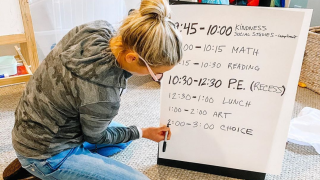
As the new coronavirus spreads, schools across the country are closing their doors and encouraging parents to help kids complete schoolwork at home until risk of catching or spreading COVID-19 have passed.
For parents, the question is, how? TODAY Parents sought advice from homeschooling parents on how to teach kids at home.
Fox Sports reporter and host of the "Players with Lindsay Czarniak" podcast Lindsay Czarniak, wife of TODAY co-anchor Craig Melvin, shared one of her survival techniques on Instagram this week: a hand-written schedule outlining her kids' "school" day at home.
"This was more for me than the kids but with a couple weeks of hunkering down ahead for them I followed the advice one of my son's teachers shared," Czarniak wrote in her post, joking that "Recess/PE was waaay too long but I had a meeting."
Journalist and college professor Alissa Wilkinson solicited help from homeschooling parents on Twitter, asking for advice for "people who are going to be trying to 'do school' at home for the next month," and received suggestions ranging from knocking out difficult subjects first thing in the morning to making sure to get up and get dressed before starting schoolwork to optimize success.
For parents who, like these moms, are asking, "What do I do now?" we talked to moms who homeschool and rounded up 12 tips for homeschooling your kids — even if just temporarily — during the coronavirus pandemic.
1. Hold a family meeting
Coronavirus Pandemic
Full coverage of the COVID-19 outbreak and how it impacts you
Heather Bowen, a mom of two from Myrtle Beach, South Carolina, says when facing an unexpected homeschool situation, family planning is key.
"Talk to your children about this 'new normal,' and communicate with them that while they may be at home, there are still assignments that must be completed in a timely manner," said Bowen, who blogs about homeschooling her daughters, Shaylie, 15, and Nevaeh, 14, at Mom for all Seasons. "Since your child is coming from a structured school environment, I would definitely continue on with providing structure for both them and you."

2. Create a daily schedule
Bowen says it's important to have set hours for school, meals, chores and other daily activities.
Maria Chamberlain, a mom of seven who has been homeschooling for 29 years, agrees.
"Many routine activities are now disrupted, and that's going to be an emotional process for everyone," Chamberlain told TODAY Parents. "Kids are going to be disappointed, as are parents, not to have their normal routine."
Chamberlain, who lives in Strafford, New Hampshire, suggests talking together as a family about the coronavirus outbreak and how it's affecting everyone.

Megan Currier
"Then, decide on a schedule together as a team," said Chamberlain. "Let the kids help plan it and it will run smoother."
3. Ask your school district for support
"I would highly suggest that you reach out to your local school district and determine what resources, in terms of curriculum, online learning platforms, supplies, etc., are available to you," Bowen suggested. "Talk to your child's teacher and find out exactly what is expected from them in terms of assignments and school work during this time."
4. Help kids create a learning environment
Leah Duke, a Montana mom of three who has been homeschooling since 2004, says it's important to remember that each child learns differently and may perform better in a different work environment.
"Help them create their own work space — at the kitchen table, on their bed, in a comfy chair in the living room — and know that you may find a rotation works well for different subjects, especially for those students accustomed to visiting a different classroom and teacher for math, English and electives," said Duke.

Dylan Duke
5. Don't be afraid to bribe 'em
"Some students are self-motivated," said Duke. "But some may need time limits or incentives like, 'You need to finish ABC before you can XYZ.' Not every student is a morning person, but it's much easier to accomplish what you need to first thing, before the whole day slips by, so that's a great case for building incentives into your new routine — just as we encourage our children to eat their vegetables before they can have a slice of cake."
Bowen suggests incentives like time with electronics or playtime once schoolwork is complete, and suggests making expectations clear to kids so there's no confusion about what they need to get finished to earn their reward.
"For younger children, a dry erase board, where you can list out all assignments and chores for the day and then check them off as they go, may be most effective," added Bowen.
6. Take breaks
Amber Mathison, founder of ABC's to ACT's, an online educational resource for parents, teachers and homeschoolers, says downtime is just as helpful in getting through the school day as a schedule.
"Whether it's while they're changing classes or while they're waiting for other students to finish their work, your child has several moments of downtime throughout a normal school day," said Mathison. "Remember to give them the same while they're at home. Believe me, when you're struggling through a math assignment, a quick 15-minute break can do wonders for both your patience and their ability to get through the material."
7. Make it fun
Florida mom Wendy Moores has been homeschooling her daughters, Melody and Anika, since they were in fifth grade. Today, Moores' daughters are in college and asked to continue homeschooling for their collegiate years.
Moores says everything is an opportunity to learn, and being at home with your kids gives you the chance to try some outside-the-box ways to absorb information.
"Grocery shopping can be lessons on everything from color, shape and sizes for the young ones to multiplication and percentages for your older ones," said Moores. "Taking a long walk can be a lesson in botany or biology. And those experiences that you seek out become field trips that will be a blast and something special because you are schooling your children."

Wendy Moores
Moores also recommends taking lessons outdoors.
"There were days that my daughters and I were crawling up the walls, said Moores, "so we did our spelling practice out on the driveway with chalk and we gathered rocks in our yard to practice math."
9. Give kids the reins
"At the end of the day, it doesn't really matter all that much if they finished their math work before their science," said Mathison. "Let them decide which subject they'd like to dive into first, or better yet, grab a spiral notebook or a piece of paper and simply write out the assignments they need to finish for the day. Let them work through the list in whatever order they'd like, checking them off as they go."
10. Do your own homework
Moores said in her eight years of homeschooling, she's learned the importance of taking time to make a plan of her own for how she will handle the flow of her days.
"You need to do your homework so you can show them how to do theirs," said Moores. "Schedule out lessons and read their textbooks before they do. Have a good lesson planner as a scheduling tool — that's a must."
11. Hold a daily wrap-up meeting
Erica Arndt, who blogs at Confessions of a Homeschooler, said one key to her success as a home educator is a daily meeting.
"I find it helpful to have a 10-15 minute daily wrap-up meeting at the end of the school day to go over my children's work," said Arndt, who has been homeschooling her 17-, 15-, 14- and 11-year-old children since they were in preschool. "They each pick a time slot and I sit down with them one-on-one. We discuss any questions that they had, check to make sure everything was completed and grade anything that needs grading."

Erica Arndt
"Daily meetings help me stay on top of grading so I am not overwhelmed," the Colorado mom continued. "And, it helps my children get a clear sense of accomplishment for today and know what will be required tomorrow."
12. Give yourself grace
"You've been thrown into a situation that is unfamiliar and somewhat scary," said Mathison. "Your 'school day' will not be perfect, and that's OK. Just try to remember that you're both adjusting to something new and there will be some bumps along the way."
"This may be an unexpected occurrence," added Moores, "but I would be so bold as to say that it will be the blessing you never thought you wanted."
This story first appeared on TODAY.com. More from TODAY:


